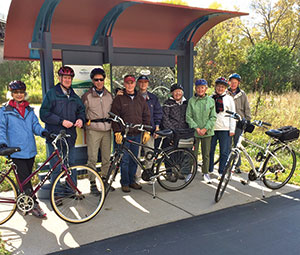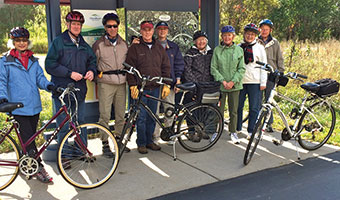While much is said about financial planning for retirement, little is mentioned about what to do during retirement. Unlike past generations, many of today’s retirees have freedom, longevity and an ability to do things they want to do, not just what they have to do.
Purposeful Retirement, a ministry of Shepherd of the Valley Lutheran Church in Apple Valley, Minn., is designed to guide retirees as they enter what could well be their “second half” of life. It was inspired by a similar ministry at Redeemer Lutheran Church in nearby White Bear Lake and a workshop on older adult ministries organized by Lyngblomsten, an ELCA-affiliated social ministry organization.
“We have always had events for ‘seniors,’ but have had trouble engaging people ages 55 to 70 because they don’t self-identify as seniors,” said Trip Sullivan, communications director for Shepherd of the Valley. “Purposeful Retirement has met that need and become a runaway success.”

Photo by John Eidem
Bikers, part of the Purposeful Retirement program of Shepherd of the Valley Lutheran Church, Apple Valley, Minn., pause along the local biking trail.
Launched a year ago, Purposeful Retirement holds monthly meetings (free and open to the public) that include guest speakers, roundtable discussions and book reviews. Topics have ranged from strengthening family relationships to finding volunteer opportunities.
The concept of retirement is changing for the baby boomer generation. Today’s retirees are healthier, have more energy and are driven by different values than previous generations. Many see retirement not as an escape but as an opportunity to connect more deeply with friends, family and their neighborhoods.
Jim Winslow, already an active volunteer, put it this way: “For those of us fortunate enough to be able to retire, retirement is a gift from God. It is a special time to serve others and enrich ourselves and our families.”
By the numbers
The sheer number of retirees in America is astounding — 75 million baby boomers are on the verge, and for the next 20 years an average of 10,000 people will each day reach age 65 (historically the retirement phase of life), according to U.S. News & World Report. At Shepherd of the Valley, more than 1,500 members are age 55 and older.
“Every meeting of this group amazes me,” Jane Stubblefield said. “We are so blessed to have a large group of retired (or almost retired) people eager to contribute their talents and energy to the church, and also willing to grow and take some risks at this stage of their lives.”
Linda Prince, who has helped plan the Purposeful Retirement meetings, has been impressed by the conversations. “People are living vital, purposeful lives already in retirement,” she said. “I am learning a lot from them.”
Kristi Kuhnau, who took a lead role in getting the program started, noticed how hungry retirees are for connections and a sense of community. “Replacing one’s social career network is one of the hardest things about retirement,” she said. “Our hope is that Purposeful Retirement events give us a way to create that needed community.”
Participants have also bonded over shared interests. Last summer several “affinity groups” began meeting for outings and activities based on common interests. For example, Judy Hartfiel helps coordinate the Soul Steppers (pun intended), a walking group.
Kuhnau summed it up this way: “It helps us realize the great potential for making a contribution in our retirement and what our contribution could be.”
Getting started
Even if your congregation already has a program in place for seniors, it’s easy to get stuck in “the potluck zone” and only offer social activities. To expand your ministry to include spiritual growth, education and service opportunities:
Discover your champion. Is there a member already passionate about retirement ministry who just needs support and encouragement? An energetic partner is invaluable for generating ideas and spreading the word to others.
Ask questions. Hold a focus group or series of informal meetings with other parishioners. What are the demographics? What do they need? What interests them?
Make a plan. Form a steering committee to analyze your findings and develop a plan with clear objectives and outcomes. Decide who your target audience is (already retired or nearing retirement?) and how to best reach them.
Pilot events. Invite people to a series of events over a short period of time. Each event should be specific in focus and enticing. Make clear the value in attending, such as “finding the right volunteer job.”
Change it up. Go for a variety of formats, such as a guest speaker or panel, roundtable discussions and off-site field trips. Try different times and days of the week. Weekdays may be best for people already retired, but weeknights and weekends will be better for people still working.
Expand and invite. Get feedback and ideas from participants and use that information to develop a full calendar of events for six months or up to a year. Continue to seek and invite new people.
By Trip Sullivan, communications director, Shepherd of the Valley Lutheran Church, Apple Valley, Minn.





